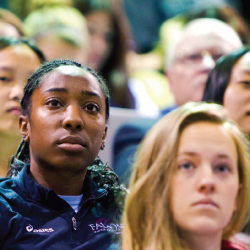Science, Faith, and Interdisciplinary Exploration
The 2011 Day of Common Learning
 More than 1,600 people attended the 2011 Day of Common Learning sessions.
More than 1,600 people attended the 2011 Day of Common Learning sessions.
In October, during Seattle Pacific University's annual day for learning outside the regular classroom, faculty members led 22 seminars that explored science-related topics from the perspective of a host of disciplines, including music, theology, philosophy, exercise science, and psychology. More than 1,600 students, faculty, staff, and community members attended, and many of the sessions have audio and video available at spu.edu/itunes. Here are some of the topics covered:
C.S. Lewis, Astrobiology, and the Perelandra Thesis
What are the theological implications if life were ever discovered on other planets? Bruce Baker, assistant professor of business ethics, and Stamatis Vokos, professor of physics, explored this question using the fictional work of C.S. Lewis. Baker spoke of C.S. Lewis' treatment of the subject of extra-terrestrial life in his science fiction trilogy that includes Out of the Silent Planet, Perelandra, and That Hideous Strength. Vokos then examined Scriptures' assertion that the incarnation of Jesus Christ is enough to transform and redeem the whole of creation. Together, they concluded by proposing that Jesus is the only redeemer necessary for the entire cosmos.
Contributions of Women to Science
Assistant professors of biology Janet Bester-Meredith and Cara Wall-Scheffler led a discussion of the role of women in the sciences today. The statistics, they said, are troubling. Though more women attend university and hold Ph.D.s in the life sciences, social sciences, and psychology than men, women scientists are sorely underrepresented on the faculties of the top 100 U.S. universities. They hold 15.8 percent of tenure-track teaching positions and less than 10 percent of full professorships. Women scientists also face discrimination, including biased hiring practices, underfunding of science research, and consistent underrating for teaching positions and journal publishing. Despite the statistics, commented Bester-Meredith and Wall-Scheffler, several factors have been proven to help women scientists achieve success: finding advocates/mentors, supportive spouses, and identifying fields where women have made significant inroads, such as genetics, crystallography, and astronomy.
Free Will: What is It, Have We Got It, and Does It Matter?
Professor of Philosophy Steve Layman and Assistant Professor of Psychology and Biology Baine Craft tackled the daunting, perennial question of free will in their Day of Common Learning seminar. Free will, said Layman, is "the power to do otherwise than one in fact does," while determinism dictates that, "given the past, only one future is possible." So are free will and determinism compatible? Experts disagree, but the answer matters, says Layman, because hanging in the balance are "moral responsibility, divine goodness, the meaning of life, and the problem of evil." Craft spoke of psychology and determinism, explaining that psychological studies suggest that our responses are often automatic, lack intention, and determined. Yet, he said, the belief that we have some control over our thoughts, behaviors, and environment is important for us to function.
Faith and Science: Perspectives from Christian Biologists
What does it mean to be a Christian biologist? In this seminar, Ryan Ferrer, Eric Long, and Charlotte Pratt, all assistant professors of biology, discussed the antagonism they've encountered toward faith among nonbelieving peers — and the alienation they've felt sharing their scientific views among believers in faith settings. To straddle these two worlds, the professors offered two strategies. The first is to earn credibility by being people who think deeply through issues, build trusting relationships, and show integrity in their actions. And the second is to help people recognize that scientists magnify God's greatness by bringing new understanding to how things work, while Christians magnify God by bringing out the beauty, purpose, and meaning behind these discoveries.
Real or Not Real? Science Fiction That Ignites Our Fears
"Spoiler alert!" Adrienne Meier, SPU librarian, announced at the beginning of the session on The Hunger Games, Suzanne Collins' popular science fiction trilogy. A few students trickled out, but most of the audience already knew the plots of all three books. For the first half of the session, presenters Meier, SPU Librarian Cindy Strong, and Professor of Curriculum and Instruction Tracy Williams spoke about science, entertainment, and hope as seen in the books. Then Laura Sweat, assistant professor of biblical studies, facilitated a group discussion among the audience on questions such as "How do we as people of faith respond to this violent story?"
